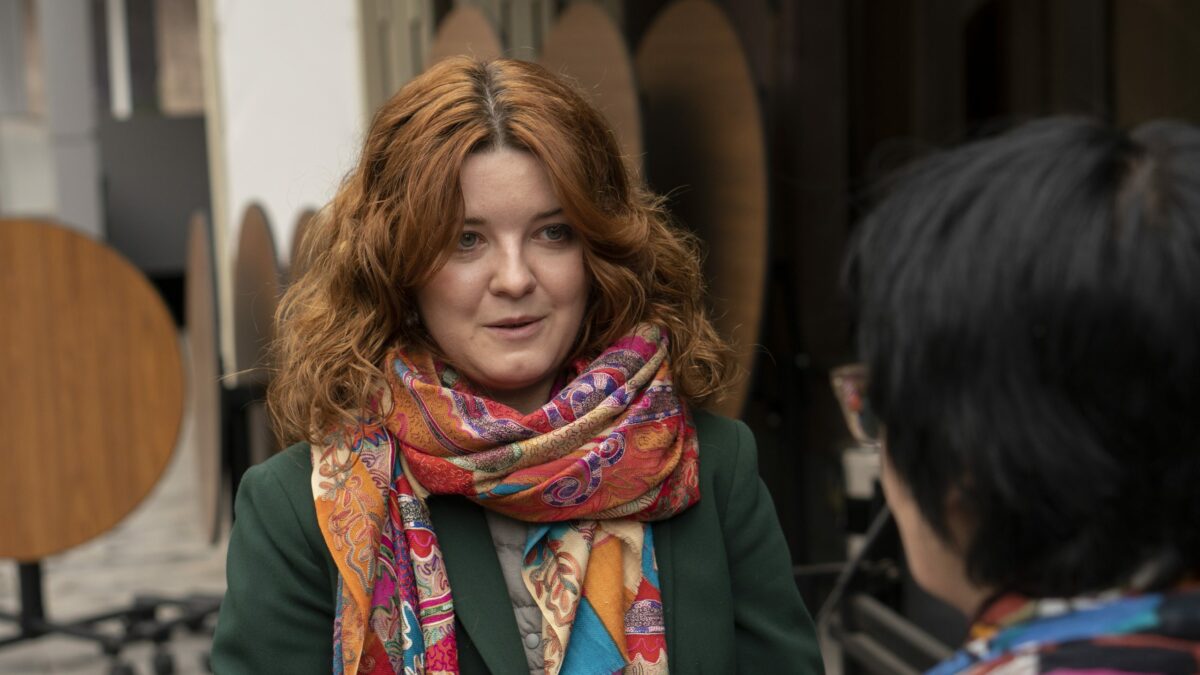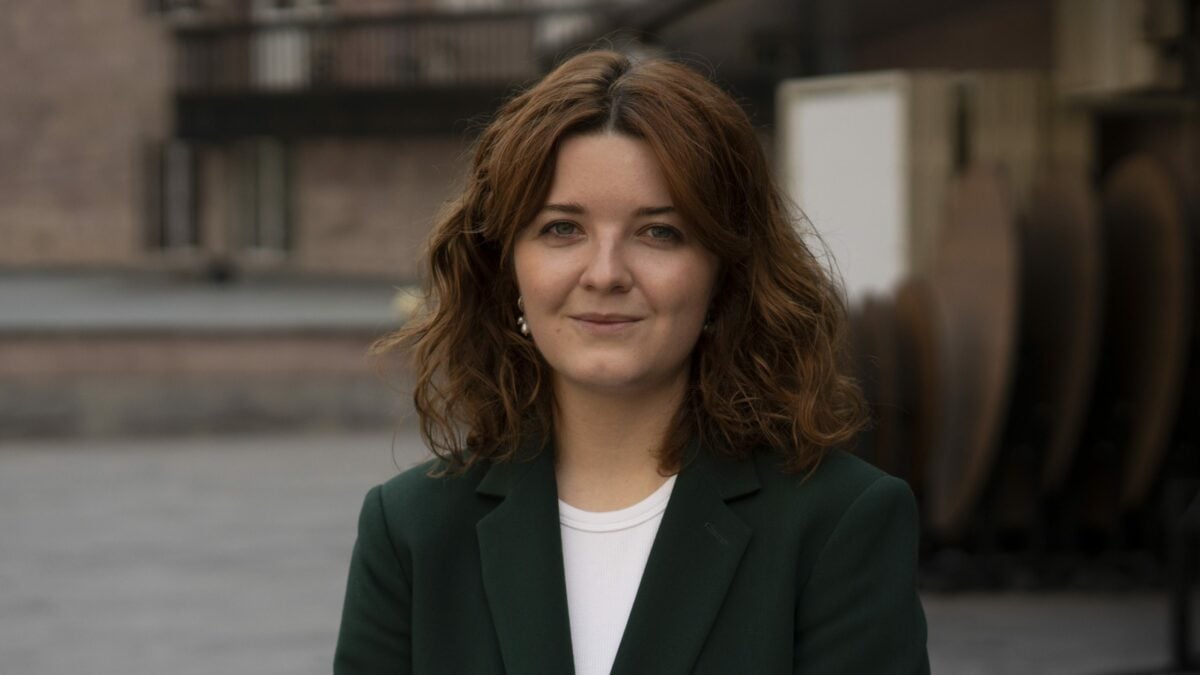Journalist, broadcaster, and author of various series on economic issues Margarita Lyutova is convinced that economic science can be very interesting and useful because it is not about numbers, tables, and economic models, but about people.
That science determines our behavior every minute, even if we think we know nothing about economics. For example, when we decide to sleep half an hour more in the morning, we make an economic decision by managing our most valuable resource, time.
She spoke about this topic during the “DigiStory” (Tvapatum) media conference. And she reminded the audience that if you understand how important decisions are made and what consequences they leave in everyday life, you are more prepared to face the shocks. And now Russia is obviously shocked.
Margarita Lyutova, like her colleagues, is in a difficult situation now. Dozhd Internet TV, of which she was a member, has been blocked and has stopped working in Russia.
Due to the Russian-Ukrainian war, the media in Russia is undergoing a serious transformation, which is no less alarming than the state of the economy, which is bending under international sanctions. And it is difficult to predict what will happen even in a few days, let alone in a few years.
Margarita says that it is difficult to find a rational explanation. The mechanism of irrational political pressure works.
Markets in Russia are disintegrating and the media field is in a straitjacket. What role can journalists writing about the economy play in this situation?
It seems that the subject economy has now passed into the background, because there is a war and a humanitarian catastrophe, and our losses (for example, problems with credit cards, rising prices of goods, blockades, etc.) are nothing compared to the tragedy of human destinies.
But it is worth admitting that the created economic situation will last for a long time.
War has a price, which, unfortunately, is paid by everyone, even a person completely detached from politics.
I think that we, the journalists, are responsible to our audience, to which we also offer services. And since people have questions (about what to do), we must try to find answers, no matter how much they seem to go against the background of the devastation of the primary war, the news about the victims.
Economic journalists are also translators. They translate often boring and complicated economic language and make it understandable. Although, of course, it is very difficult to do it now.
“Dozhd” stopped its broadcast. Are there any media outlets where you work now or is everything very bad?
Now I am cooperating with VPost small media covering economic topics, which was founded by the journalists of the former (during good times) “Vedomosti” newspaper. We are not big, but we try to do our best.
It is not true to say that the Russian independent media field is being emptied. In other words, the idea that only the conventional “First Channel” works now is a bit of an exaggeration.
Let us also not forget that there are independent media outlets that have been working for a Russian-speaking audience but from abroad for a long time.
The impression is that professional journalism now has to operate underground if it wants to continue to be heard. Is that true?
We hope that it will not go completely underground, but it turns out that it needs a certain distance in order to work. The other side of the issue is that experts who comment on the situation from abroad are also leaving the country.
Many Armenian media outlets have English and Russian versions. Do we consider the possibility that Russian journalists and experts can work here as well?
I also thought about that, especially when I listened to the speeches of my Armenian colleagues during the conference.
Frankly, we in Russia never paid close attention to the Armenian media.
It is clear that when the main news coming from Armenia was about the war, the economy and experts go into the background. And now the situation is different.
For example, there are many competent Russian experts who specialize in post-Soviet countries, primarily political and economic. And involving those experts will be very useful for both sides. I will be glad to introduce them to the Armenian journalists and connect them. Maybe it will be possible to be useful to the Armenian media field with our experience and contacts.
I myself studied at the Higher School of Economics, and now my friends and I are joking that for five years we have learned something that no longer exists in Russia. Of course, it is a bitter joke, but also a reality.
Wars also raise the question of the authenticity of sources. We in Armenia know that well. Now that the only and inviolable source in Russia is official information, which is full of propaganda, how can one work?
From a practical standpoint, there is no way. Just before my eyes, during the last ten years that I am a journalist, we have reached a situation in which no state body communicates normally with journalists. Even briefings for state media are no longer organized.
Now the authorities simply publish a text or spread a message with only one camera, saying what they think they should say.
And no one asks questions anymore.
The last state body in Russia, which makes at least some comments, is the Central Bank. It is now the main newsmaker in Russia, as it has to explain what is happening on vital issues. For example, bank cards, currency, deposits, etc.
The Central Bank gives at least some comments to the media, and the rest of the state bodies have been silenced.
For example, in the past, any journalist could call the president’s press secretary Dmitry Peskov, everyone had his phone number. And now there are media outlets with which Peskov does not communicate (Dozhd was also among them), and journalists can only use the comments he has given to other media outlets. In other words, even the opportunity to ask a question has been completely eliminated.
And the journalists who had their own sources in the state system, understand very well that their sources are also afraid to communicate with the media, especially independently. At best, those sources will not speak at all.

Do you think it will flourish in the Aesopian language? “Novaya Gazeta,” for example, stated that now it has to switch to euphemisms.
What can you do if the deviation from state information has become a reason for criminal prosecution?
Nobody wants the case to reach that. Often the audience and readers complain and scold journalists that they do not call what happened in Ukraine “war” and hide the truth.
But it really contains a real risk that journalists can be considered criminals.
I think now it is more important for the Russian media to protect their own team. To not disappear.
What the state is doing now with the media field, first of all, harms the state itself. Compressing, narrowing, and closing off from air does not lead to anything good.
Everything that the Russian state does, not only in the information but in all spheres, harms the Russian state. And this has been going on for a long time.
War and economic activities no longer fit into any rational explanation. And no matter how much you explain that it is not in the interest of the state, you will not achieve the result. The authorities have their own unique rationality.
Armenia’s economy is highly dependent on Russia, especially in the energy sector. We are also trying to understand what awaits our economy. Maybe we are also afraid to talk about it.
Now any economic decision is closely connected with politics.
And it is clear that due to economic dependence, Armenia cannot afford to reorient itself to cooperation with other countries, as Russia may perceive it as an unfriendly step.
For example, Ukraine appealed to the Central Bank of Armenia to block the Russian “Mir” payment cards, which are now the only ones that work. And here a big question arises: what will Armenia do? I just cannot imagine.
It is also a serious vital issue for us, as “Mir” is the only way to connect us with Russian banks, which we trusted short-sightedly.
In general, the main word of economists now is “uncertainty.” We are in a situation like never before.
And this situation is not subject to predictions, because any prediction needs a basis, a comparison of facts that took place in the past. And now it is unknown what can be based on.
There is too much politics in the economy, which always means irrationality.
Nothing is predictable now. And the question of what will happen to the Armenian economy, I think, should first be discussed by Armenian political scientists and specialists in international relations. And only then can economists join, analyzing what connections and risks exist in which sector of the economy. Nobody can say what risks can be avoided or mitigated.
We also did not think that in Russia the case would reach extreme steps – separation from SWIFT and the international payment system. We could not even imagine that it would happen.
And the impression is that the whole economic sector of Russia was not informed about that risk.
And what effect will the blocking of social networks have on Russian users? For example, Facebook.
In Russia, Facebook is considered a social network of intelligentsia and people interested in politics. And the people who just liked to sit on the net to mindlessly scroll at what was happening or not choose VKontakte or Odnoklassniki.
VKontakte is much more popular than Facebook, which, roughly speaking, gathers “smart” people. And now those “smart people” just turned on the VPN and continue to use Facebook. Including journalists and experts.
In other words, only those who already understood everything will feel the consequences of Facebook being blocked.
For the rest, turning off Facebook is not a problem at all, many are just happy that it is not available. The blocking of YouTube and Instagram will strike a much more sensitive blow. But at the basis of these thoughts is also politics.
That is, the unpredictable.
Interview by Nune Hakhverdyan







